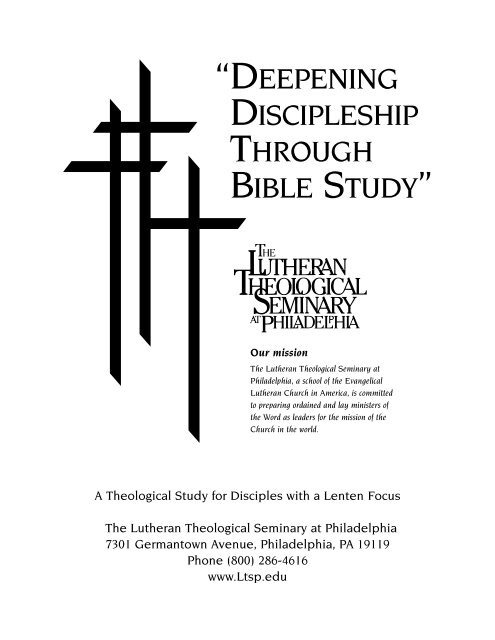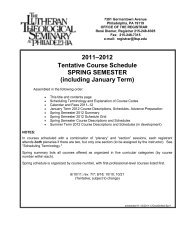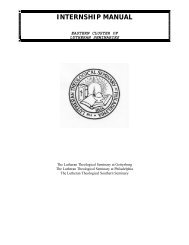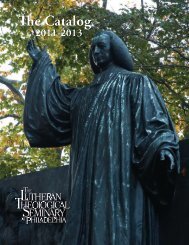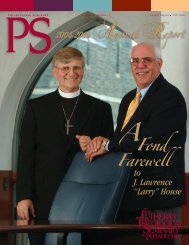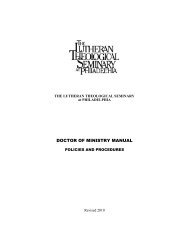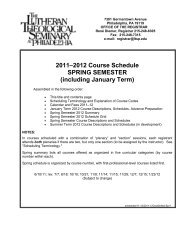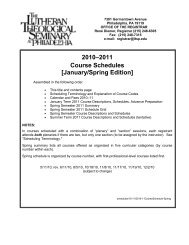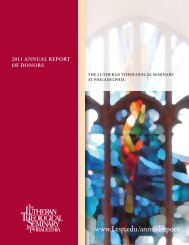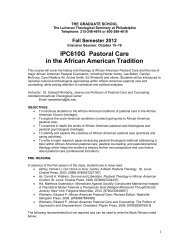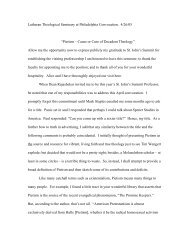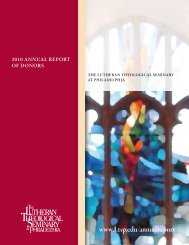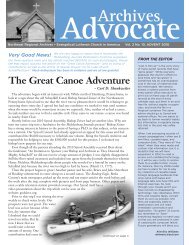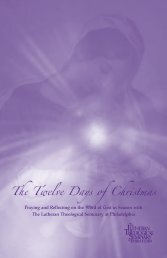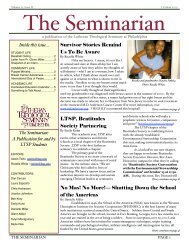GETTING STARTED - Lutheran Theological Seminary at Philadelphia
GETTING STARTED - Lutheran Theological Seminary at Philadelphia
GETTING STARTED - Lutheran Theological Seminary at Philadelphia
You also want an ePaper? Increase the reach of your titles
YUMPU automatically turns print PDFs into web optimized ePapers that Google loves.
“DEEPENING<br />
DISCIPLESHIP<br />
THROUGH<br />
BIBLE STUDY”<br />
Our mission<br />
The <strong>Lutheran</strong> <strong>Theological</strong> <strong>Seminary</strong> <strong>at</strong><br />
<strong>Philadelphia</strong>, a school of the Evangelical<br />
<strong>Lutheran</strong> Church in America, is committed<br />
to preparing ordained and lay ministers of<br />
the Word as leaders for the mission of the<br />
Church in the world.<br />
A <strong>Theological</strong> Study for Disciples with a Lenten Focus<br />
The <strong>Lutheran</strong> <strong>Theological</strong> <strong>Seminary</strong> <strong>at</strong> <strong>Philadelphia</strong><br />
7301 Germantown Avenue, <strong>Philadelphia</strong>, PA 19119<br />
Phone (800) 286-4616<br />
www.Ltsp.edu
T ABLE OF C ONTENTS<br />
“DEEPENING D ISCIPLESHIP T HROUGH B IBLE S TUDY”<br />
<strong>GETTING</strong> <strong>STARTED</strong><br />
Table of Contents<br />
Overview<br />
Images for Lent<br />
TEACHER’S GUIDE<br />
Teacher’s Guide (Inform<strong>at</strong>ion for each session.)<br />
PARTICIPANT WORKSHEETS<br />
Five Study Guides / Participant Worksheets<br />
(Reproducible for each session.)<br />
ADDITIONAL RESOURCES<br />
• Article on “Doubt” by Janet Corpus. From the Jan. – Feb. 2001<br />
issue of Sunday/Monday Woman, copyright © 2001 Augsburg<br />
Fortress. Used with permission. This article may be reproduced<br />
by the purchaser for local use only.<br />
• “Disciples: Who Are They and Wh<strong>at</strong> Do They Do?”<br />
EVALUATION AND SUGGESTIONS<br />
Evalu<strong>at</strong>ion and Suggestion Form<br />
DISCIPLES: LEARNERS AND LEADERS
O VERVIEW<br />
“DEEPENING D ISCIPLESHIP T HROUGH B IBLE S TUDY”<br />
A Resource for Lent and Other Times<br />
Produced by The <strong>Lutheran</strong> <strong>Theological</strong> <strong>Seminary</strong> <strong>at</strong> <strong>Philadelphia</strong><br />
under “<strong>Theological</strong> Educ<strong>at</strong>ion for the Laity.”<br />
<strong>GETTING</strong> <strong>STARTED</strong><br />
Lent is a good time to talk about discipleship around the topic of “Deepening Discipleship<br />
Through Bible Study.” But this study may be used <strong>at</strong> many other times.<br />
To assist congreg<strong>at</strong>ions in focusing on discipleship, The <strong>Lutheran</strong> <strong>Theological</strong> <strong>Seminary</strong> <strong>at</strong><br />
<strong>Philadelphia</strong> offers this resource, “Deepening Discipleship Through Bible Study,” under the theme<br />
of “Disciples: Learners and Leaders.” The root meaning of the word disciple is “one who learns or<br />
receives instruction from another.” You will find more about the word disciple in an article th<strong>at</strong> is<br />
enclosed.<br />
In short, these resources are to assist:<br />
• In teaching the essence of the Christian faith so th<strong>at</strong> all the baptized can “talk the talk.”<br />
• In manifesting our faith in daily life so th<strong>at</strong> all the baptized can “walk the walk.”<br />
THE TOPIC — “DEEPENING DISCIPLESHIP THROUGH BIBLE STUDY”<br />
These m<strong>at</strong>erials focus on the topic of “discipleship” by having participants examine Biblical<br />
accounts. Thus, each person will need a Bible for each session.<br />
The first disciples were very common folk. Like people today, they were eager to follow Jesus but<br />
sometimes stumbled. They were willing to lead but sometimes needed to learn first. Sounds<br />
familiar, doesn’t it?<br />
Through a study of New Testament accounts, we discover th<strong>at</strong> disciples of the first century faced<br />
the same issues th<strong>at</strong> confront disciples in the 21st century. The issues identified in this study are:<br />
• Faith<br />
• Doubt<br />
• Teamwork<br />
• Leadership<br />
• Vision<br />
Thus, this “Deepening Discipleship Through Bible Study” is a key theological resource for laity in<br />
every congreg<strong>at</strong>ion.<br />
DISCIPLES: LEARNERS AND LEADERS
O VERVIEW CONTINUED<br />
THE AUDIENCE — “DEEPENING DISCIPLESHIP THROUGH BIBLE STUDY”<br />
“Deepening Discipleship Through Bible Study” is a theological resource for ALL AGES -<br />
all the people of God. Possible audiences include:<br />
• Lenten mid-week services<br />
• Lenten Soup and Study sessions<br />
• Lenten breakfast studies<br />
• Lenten Bible study groups<br />
• Adult Forums<br />
• Advent studies<br />
• Retre<strong>at</strong>s, etc.<br />
You should make as many photocopies of the Participant Worksheet as needed so th<strong>at</strong> each person<br />
has a copy.<br />
NOTEBOOK OF RESOURCES — “DEEPENING DISCIPLESHIP THROUGH BIBLE STUDY”<br />
Each notebook contains a variety of resources.<br />
• “Images for Lent” – images to assist in your planning and promotion.<br />
• “Teacher’s Guide” – a resource for the person(s) leading each session. It provides an<br />
overview of the theme, specific teaching suggestions and background m<strong>at</strong>erials for each of<br />
the five sessions.<br />
• “Participant Worksheets” – a master copy of each of the five (5) reproducible “Participant<br />
Worksheets” for five weeks. You may print as many copies of the Study Guide as needed so<br />
each person has a copy.<br />
• “Disciples: Who are They and Wh<strong>at</strong> do They Do” – a background article on the word “disciple”<br />
plus summaries of other programs offered by “<strong>Theological</strong> Educ<strong>at</strong>ion for the Laity” of LTSP.<br />
• “Doubt” – an article by Janet Corpus from Sunday/Monday Woman.<br />
• “Evalu<strong>at</strong>ion and Suggestions” – a form on which you can return your comments and<br />
suggestions for future topics.<br />
ABOUT THE AUTHOR/EDITOR<br />
Dr. Janet Corpus, the author for this study, has been a parish pastor and is now serving as an<br />
assistant to the Bishop in Southeastern Pennsylvania Synod. Janet also has taught <strong>at</strong> The <strong>Lutheran</strong><br />
<strong>Theological</strong> <strong>Seminary</strong> <strong>at</strong> <strong>Philadelphia</strong>. The Rev. George E. Keck, Executive Editor, is Director of<br />
<strong>Theological</strong> Educ<strong>at</strong>ion for the Laity <strong>at</strong> LTSP.<br />
DISCIPLES: LEARNERS AND LEADERS
I MAGES FOR L ENT<br />
Thoughts about Lent and Discipleship<br />
As a prelude to your planning for Lent, we invite you to review the following thoughts about Lent and<br />
Discipleship. These images may be used in your planning and promotion in addition to providing you<br />
background for the study.<br />
DISCIPLES Who are they and wh<strong>at</strong> do they do? After all, we seldom hear members of <strong>Lutheran</strong><br />
congreg<strong>at</strong>ions refer to themselves as “disciples.”<br />
A disciple is simply a “learner” and a “leader.” The root meaning of the Biblical word for<br />
disciple is “one who learns or receives inform<strong>at</strong>ion from another.” In a way, the Twelve<br />
were “apprentices” with Jesus for three years. They took time to learn.<br />
After Easter, as the church expanded, the term disciple also expanded to refer to the<br />
baptized people of God (laos). During the last 2,000 years, the church of Jesus Christ has<br />
been carried forth by people who first learned the Story and then became leaders.<br />
Who are disciples today? You and me! All those who learn and lead are the “Biblical<br />
disciples” of the 21st Century.<br />
JOURNEY Living in the Northern Hemisphere, it is easy to associ<strong>at</strong>e the coming of Lent with the<br />
coming of spring. But Lent is more than just the change of seasons. We who celebr<strong>at</strong>e<br />
Lent do more than merely pass from winter into spring.<br />
Nor is Lent merely a 40-day season th<strong>at</strong> focuses on the story of Jesus’ passion and<br />
de<strong>at</strong>h. We know how the story ends!<br />
R<strong>at</strong>her, Lent is a journey of a people who have been forever marked by the story’s end –<br />
by Jesus’ passion, de<strong>at</strong>h and resurrection. Once each year, the journey is a time of<br />
renewal and study for disciples.<br />
PASSAGE We are born to die! Life is a passage from beginning to end. The ashes of Ash Wednesday,<br />
in spite of all of our denials, remind us th<strong>at</strong> we will die. Dust we are and to dust we shall<br />
return. Being part of God’s good cre<strong>at</strong>ion, aging is the passage form birth to de<strong>at</strong>h. Aging<br />
is not a disease but a gift from God. During each season of life, disciples have different<br />
gifts to offer and opportunities to learn.<br />
During Lent we affirm th<strong>at</strong> we live because of a de<strong>at</strong>h – because of the de<strong>at</strong>h and<br />
resurrection of Jesus – in which we share through baptism.<br />
BAPTISM Lent is about God baptizing us into a life of faithful discipleship, or to use Martin Luther’s<br />
lovely language, “creeping back to the font.”<br />
Lent is a time for disciples to learn how to “talk the talk” so th<strong>at</strong> we can “walk the walk.”<br />
How can we live out our baptism in our daily life? By spending these 40 days of Lent<br />
learning and preparing ourselves to renew our baptismal covenant.<br />
[Prepared by George E. Keck, Director of Lay <strong>Theological</strong> Educ<strong>at</strong>ion, LTSP.]<br />
DISCIPLES: LEARNERS AND LEADERS
P ARTICIPANT W ORKSHEET<br />
S ESSION 1: “FAITH”<br />
OPENING PRAYER<br />
O God, we rely on your faithfulness to us. Be with us now. Enrich our faith. Amen<br />
ACTIVITY: Wh<strong>at</strong> is faith?<br />
1) Faith is wh<strong>at</strong> we know and believe.<br />
2) Faith is wh<strong>at</strong> we experience.<br />
3) Faith is wh<strong>at</strong> makes a difference in our <strong>at</strong>titudes and actions.<br />
EXPLORING SCRIPTURE<br />
Luke 8:42b-48 (Other options: Luke 7:36-50, M<strong>at</strong>thew 15:21-28.)<br />
1) Who are the characters/persons in the story?<br />
2) Describe the person who approaches Jesus. Wh<strong>at</strong> is the need/problem? Wh<strong>at</strong> is said?<br />
3) Wh<strong>at</strong> is the person’s rel<strong>at</strong>ionship to the faith community of th<strong>at</strong> time?<br />
4) How does Jesus respond to the person in need?<br />
5) Jesus refers to the person’s faith. Wh<strong>at</strong> does he say?<br />
DISCIPLES: LEARNERS AND LEADERS
RESPONDING<br />
P ARTICIPANT W ORKSHEET<br />
S ESSION 1: “ F AITH” CONTINUED<br />
1) How did you come to the faith you have?<br />
2) Wh<strong>at</strong> people were important?<br />
3) How would you describe your faith to someone who is not Christian?<br />
SUMMARY<br />
CLOSING PRAYER<br />
Faithful God, we thank you th<strong>at</strong> you have made yourself known to us in Jesus Christ. Thank you for<br />
Jesus’ faith th<strong>at</strong> sustains us. Thank you for the surprises th<strong>at</strong> come from faith shared. Amen<br />
FOR FURTHER EXPLORATION<br />
• Dorothy C. Bass, ed., Practicing Our Faith: A Way of Life for a Searching People (Jossey-Bass, 1997).<br />
• Faith Questions for Families (Augsburg Fortress, 2000).<br />
• LBW #93 Jesus, Refuge of the Weary, or WOV #735 God! When Human Bonds Are Broken.<br />
DISCIPLES: LEARNERS AND LEADERS
P ARTICIPANT W ORKSHEET<br />
S ESSION 2: “ D OUBT”<br />
OPENING PRAYER<br />
Dear friend Jesus, you loved your first disciples who, like us, didn’t know all the answers<br />
and sometimes doubted. Be with us now. Uphold us in times of belief and unbelief. Amen<br />
ACTIVITY: Wh<strong>at</strong> about religious doubt?<br />
1) Wh<strong>at</strong> are religious doubts about?<br />
2) How have doubts affected your faith?<br />
EXPLORING SCRIPTURE<br />
• John 20:19-30 (another option – M<strong>at</strong>thew 14:28-33).<br />
1) Describe the doubts of the person in this story.<br />
2) Wh<strong>at</strong> is Jesus’ response? Wh<strong>at</strong> does he do? Wh<strong>at</strong> does he say?<br />
3) Do you think th<strong>at</strong> all of the first disciples had doubts? If so, why?<br />
DISCIPLES: LEARNERS AND LEADERS
RESPONDING<br />
P ARTICIPANT W ORKSHEET<br />
S ESSION 2: “ D OUBT” CONTINUED<br />
1) Describe the last time you had doubts.<br />
2) Wh<strong>at</strong> events prompted your doubts?<br />
3) How did another person(s) help you?<br />
SUMMARY<br />
CLOSING PRAYER<br />
Gracious and loving God, Jesus’ first followers worshipped though some doubted. As you<br />
sustained them, so sustain us. As you used them as faithful witnesses amidst their doubts, so<br />
also use us. Even use our questions to proclaim your never failing love. Amen<br />
FOR FURTHER EXPLORATION<br />
• Janet M. Corpus, “Doubt: Test or Testimony?” Sunday/Monday Woman (January-February 2000).<br />
Included <strong>at</strong> the back of this notebook.<br />
• LBW #293 or #294 My Hope Is Built on Nothing Less or WOV #660 I Want Jesus to Walk with Me.<br />
DISCIPLES: LEARNERS AND LEADERS
P ARTICIPANT W ORKSHEET<br />
S ESSION 3: “ T EAMWORK”<br />
OPENING PRAYER<br />
Lord Jesus Christ, you chose the twelve disciples to serve with you. As you taught them, so<br />
teach us as we g<strong>at</strong>her this day. Amen<br />
ACTIVITY: Wh<strong>at</strong> is teamwork?<br />
1) Wh<strong>at</strong> qualities/gifts are needed for teamwork?<br />
2) Wh<strong>at</strong> blocks teamwork?<br />
EXPLORING SCRIPTURE<br />
1) Luke 5:5; Luke 9.20.<br />
Wh<strong>at</strong> qualities/gifts do you find in Peter?<br />
2) Mark 1:20; Mark 10:35-41.<br />
Wh<strong>at</strong> qualities/gifts do you find in James and John?<br />
3) John 6:2-7; John 14:6-9.<br />
Wh<strong>at</strong> qualities/gifts do you find in Philip?<br />
DISCIPLES: LEARNERS AND LEADERS
P ARTICIPANT W ORKSHEET<br />
S ESSION 3: “ T EAMWORK” CONTINUED<br />
EXPLORING SCRIPTURE C ONTINUED<br />
4) John 11:16; John 14:5-7.<br />
Wh<strong>at</strong> qualities/gifts do you find in Thomas?<br />
5) M<strong>at</strong>thew 26:14-16; John 26:20-25.<br />
Wh<strong>at</strong> qualities/gifts do you find in Judas Iscariot?<br />
RESPONDING<br />
1) Wh<strong>at</strong> teamwork qualities/gifts are needed most in our congreg<strong>at</strong>ion?<br />
2) How might teamwork be developed in the congreg<strong>at</strong>ion?<br />
CLOSING PRAYER<br />
Jesus, with humor, compassion, and purpose you have called us together. Give us open hearts<br />
for laughter, grace to minister together with others, and confidence th<strong>at</strong> you know wh<strong>at</strong> you<br />
are doing with us, just as you knew wh<strong>at</strong> you were doing with your first followers. Amen<br />
FOR FURTURE EXPLORATION<br />
• Peter L. Steinke, Healthy Congreg<strong>at</strong>ions: A Systems Approach (The Alban Institute, 1996).<br />
• LBW #126 Where Charity and Love Prevail or WOV #755 We Are All One in Mission.<br />
DISCIPLES: LEARNERS AND LEADERS
P ARTICIPANT W ORKSHEET<br />
S ESSION 4: “ L EADERSHIP”<br />
OPENING PRAYER<br />
Holy Spirit, you give us gifts and talents for holy purposes in daily life. As we g<strong>at</strong>her here, make us<br />
aware of your presence among us and your gifts in ourselves and in others. Amen<br />
ACTIVITY: Wh<strong>at</strong> are the qualities/gifts of a church leader?<br />
1) Wh<strong>at</strong> skills/qualities do you expect in a church leader?<br />
2) Wh<strong>at</strong> skills/qualities are most often lacking?<br />
EXPLORING SCRIPTURE<br />
M<strong>at</strong>thew 16:13-16<br />
John 13:21-30<br />
Luke 22:31-34 and Luke 22:54-62<br />
Mark 14:46-50<br />
1) Wh<strong>at</strong> leadership challenges or dilemmas did Peter face?<br />
2) Wh<strong>at</strong> leadership qualities did Peter show?<br />
3) In wh<strong>at</strong> ways did Peter fall short as a leader?<br />
DISCIPLES: LEARNERS AND LEADERS
RESPONDING<br />
P ARTICIPANT W ORKSHEET<br />
S ESSION 4: “ L EADERSHIP” CONTINUED<br />
1) Wh<strong>at</strong> are the ways th<strong>at</strong> congreg<strong>at</strong>ional leaders are developed and/or supported?<br />
2) Wh<strong>at</strong> additional ways could leaders be developed and supported in the congreg<strong>at</strong>ion?<br />
SUMMARY<br />
CLOSING PRAYER<br />
Gracious God, you call us to follow you as you lead. Keep our hands and hearts in yours so th<strong>at</strong> we<br />
do not lose our way. As you lead us, help us to lead each other in your name. Amen<br />
FOR FURTHER EXPLORATION<br />
• P<strong>at</strong>ricia D. Brown, Learning to Lead from Your Spiritual Center (Abingdon, 1996).<br />
• LBW #501 He Leadeth Me: Oh, Blessed Thought or WOV #662 Restore in Us, O God.<br />
DISCIPLES: LEARNERS AND LEADERS
P ARTICIPANT W ORKSHEET<br />
S ESSION 5: “ V ISION”<br />
OPENING PRAYER<br />
Lord Jesus, you are the Light of the world; help us to see. Open our eyes to the possibilities th<strong>at</strong><br />
you have put before us as your disciples. In your name we pray. Amen<br />
ACTIVITY: Wh<strong>at</strong> is vision?<br />
1) Wh<strong>at</strong> does the word “vision” mean for you as a Christian?<br />
2) Who are some persons th<strong>at</strong> have “vision”?<br />
EXPLORING SCRIPTURE<br />
1) Luke 23:44 – 49.<br />
Wh<strong>at</strong> vision/possibilities did the disciples see <strong>at</strong> the time of Jesus’ crucifixion?<br />
2) John 20:6-9.<br />
Wh<strong>at</strong> vision/possibilities did the disciples see <strong>at</strong> the time of Jesus’ resurrection?<br />
3) Luke 24:13-27 and John 21:14-17.<br />
Wh<strong>at</strong> direction/vision/possibilities did Jesus give for the future?<br />
4) M<strong>at</strong>thew 28:16-20 and John 20: 15-17.<br />
Wh<strong>at</strong> is the vision th<strong>at</strong> Jesus has for the disciples?<br />
DISCIPLES: LEARNERS AND LEADERS
RESPONDING<br />
P ARTICIPANT W ORKSHEET<br />
S ESSION 5: “ V ISION” CONTINUED<br />
1) Wh<strong>at</strong> new vision/possibilities do you see for yourself for the future?<br />
2) Wh<strong>at</strong> are new vision/possibilities for the congreg<strong>at</strong>ion for the future?<br />
SUMMARY<br />
EVALUATIONS AND SUGGESTIONS<br />
CLOSING PRAYER<br />
God of light and love, you have given us so many gifts and possibilities for the future. Now may<br />
your peace and presence go with us into th<strong>at</strong> future. Amen<br />
FOR FURTHER EXPLORATION<br />
• Robert Farrar Capon, The Mystery of Christ . . . & Why We Don’t Get It (Eerdmans, 1993).<br />
• LBW #94 My Song Is Love Unknown or WOV #657 The Glory of These Forty Days.<br />
DISCIPLES: LEARNERS AND LEADERS
“DISCIPLES -<br />
Who are they and Wh<strong>at</strong> Do they Do?”<br />
Somewhere over the past<br />
centuries many have lost touch<br />
with the root meaning of the<br />
word disciple. The <strong>Theological</strong> Word<br />
Book of the Bible begins the definition<br />
this way:<br />
Disciple is the English form of<br />
L<strong>at</strong>in discipulus which is derived<br />
from discere, to learn, and so<br />
means “learner”, “scholar”,<br />
“pupil”, and, sometimes<br />
“apprentice” (cf. German Lehrling).<br />
The exactly corresponding Greek<br />
word is m<strong>at</strong>hetes, also derived from<br />
the verb meaning “to learn.”<br />
BEING A DISCIPLE IN THE<br />
FIRST CENTURY<br />
The word “disciple” occurs some<br />
250 times in the New Testament.<br />
Occasionally the disciples of John or<br />
the disciples of the Pharisees are<br />
mentioned, but most of the time in<br />
M<strong>at</strong>thew, Mark, and John, the word is<br />
used to speak of Jesus’ disciples.<br />
Who were these first “learners?”<br />
Wh<strong>at</strong> kind of people did Jesus call to<br />
be his first “apprentices?”<br />
First, it appears th<strong>at</strong> they were<br />
about the same age as Jesus and they<br />
were working in a variety of commonplace<br />
or routine occup<strong>at</strong>ions, for<br />
th<strong>at</strong> day.<br />
Second, some of the first disciples<br />
were a bit slow to learn. Most<br />
had questions and doubts.<br />
In Luke and Acts, as the early<br />
church spreads, we find the word<br />
“disciple” being extended beyond<br />
the original 12. Gradually, in the<br />
early church, “disciples” becomes<br />
the distinctive term for the laos - all<br />
people who were baptized and<br />
believe in Christ.<br />
Luke/Acts and the early church<br />
seem to add a second dimension —<br />
living a life th<strong>at</strong> grows out of the<br />
roots of wh<strong>at</strong> one believes. One<br />
passage from Luke serves as a<br />
dram<strong>at</strong>ic example:<br />
“Whoever comes to me and does<br />
not h<strong>at</strong>e f<strong>at</strong>her and mother, wife<br />
and children, brother and sisters,<br />
yes, even life itself, cannot be my<br />
disciple.” (Luke 14:26).<br />
With Jesus, “discipleship” becomes<br />
more than “membership.”<br />
The Gre<strong>at</strong> Commission found in<br />
M<strong>at</strong>thew 28:16-20 may be the most<br />
familiar passage about disciples. It<br />
also provides the focus of the<br />
mission they are to carry out.<br />
Now the 11 disciples went to<br />
Galilee, to the mountain to which<br />
Jesus had directed them. When<br />
they saw him, they worshiped<br />
him; but some doubted. And<br />
Jesus came and said to them, ‘All<br />
authority in heaven and on earth<br />
had been given to me. Go therefore<br />
and make disciples of all<br />
n<strong>at</strong>ions, baptizing them in the<br />
name of the F<strong>at</strong>her and of the<br />
Son and of the Holy Spirit, and<br />
teaching them to obey everything<br />
th<strong>at</strong> I have commanded you. And<br />
remember, I am with you always,<br />
to the end of the age.’<br />
BEING A DISCIPLE IN THE<br />
21ST CENTURY<br />
In some ways, the 21st Century is<br />
like the First Century. We, too, live<br />
in a socio-economic culture th<strong>at</strong> is<br />
indifferent, if not hostile, toward the<br />
Christian faith. People around us,<br />
sometimes we ourselves, do not<br />
know the Story. We don’t know how<br />
to “talk the talk.” We, too, are not<br />
sure how to “walk the walk.” The<br />
result is th<strong>at</strong> many believers today<br />
find themselves filled with doubts<br />
and questions, often feeling<br />
confused and alone!<br />
Loren Mead critiques this situ<strong>at</strong>ion<br />
in which we find ourselves as<br />
the “demise of Christendom.” Gone<br />
are the former social orders and the<br />
everyday life incidents th<strong>at</strong> supported<br />
the church in the development<br />
of faithful believers. The<br />
departure of such traditions as<br />
Sunday Blue Laws, stable family<br />
structures as pictured by Norman<br />
Rockwell, preferential tre<strong>at</strong>ment for<br />
the church and clergy, prayers in<br />
school, and occurrences of litig<strong>at</strong>ion<br />
and tax<strong>at</strong>ion deb<strong>at</strong>es are only a few<br />
illustr<strong>at</strong>ions of the demise of<br />
“Christendom” over the past century.<br />
Mead suggests th<strong>at</strong> the church of<br />
the future is faced with the<br />
challenge of how to go about the<br />
form<strong>at</strong>ion of the disciples in the<br />
DISCIPLES: LEARNERS AND LEADERS<br />
21st Century. To some, his critique<br />
sounds pessimistic.<br />
On the other hand, might this<br />
actually be a good time to be the<br />
Church? Could our current situ<strong>at</strong>ion<br />
be an opportunity to get back to<br />
our roots? After reviewing the root<br />
meaning of the word “disciple,”<br />
are we not in a situ<strong>at</strong>ion like th<strong>at</strong><br />
of the First Century? We too are<br />
living in a time filled with mission<br />
possibilities.<br />
CONGREGATIONS: CENTERS FOR<br />
DISCIPLESHIP<br />
The best opportunity for the<br />
theological form<strong>at</strong>ion of disciples is<br />
one th<strong>at</strong> is the closest <strong>at</strong> hand – the<br />
congreg<strong>at</strong>ion. Worship is the setting<br />
where our identity as disciples is<br />
given in baptism. It is there th<strong>at</strong> we<br />
bring our doubts and questions<br />
much the way the first disciples<br />
did. And it is from there th<strong>at</strong> we are<br />
sent into the world.<br />
Congreg<strong>at</strong>ions have traditionally<br />
been the place where the laos have<br />
been grounded in our Story and in<br />
its meaning. Without knowledge of<br />
the Story th<strong>at</strong> sets us apart, there is<br />
no identity. No basis or standard<br />
exists by which we are to live.<br />
First, one needs to reclaim the<br />
language of discipleship. When<br />
others come into our midst, can<br />
they tell who we are by the way we<br />
talk? Words, like “grace,” “sin,” and<br />
“salv<strong>at</strong>ion” have a new meaning<br />
th<strong>at</strong> has to be learned.<br />
Second, when most congreg<strong>at</strong>ions<br />
think of “educ<strong>at</strong>ion” they<br />
think of Sunday School. In the 21st<br />
Century, th<strong>at</strong> will not be enough!<br />
Most new members do not know<br />
the Story. Some in the church<br />
have forgotten the Story. Each<br />
gener<strong>at</strong>ion has to retell the Story.<br />
Does how we spend our time <strong>at</strong><br />
church focus on helping people to<br />
become “learners and leaders?”<br />
How/where might we provide a<br />
“safe place” for people to share<br />
their doubts, their questions, their<br />
problems in life? In short, how can<br />
we better spend our time in the<br />
form<strong>at</strong>ion of disciples?
“ DISCIPLES -<br />
Who are they and Wh<strong>at</strong> Do they Do?” CONTINUED<br />
How Do We Use Our Time?<br />
We probe into how we can best<br />
spend our time in the form<strong>at</strong>ion of<br />
disciples. We can begin with some<br />
questions about how we spend our<br />
time in the settings where Gods<br />
people – the laos – g<strong>at</strong>her.<br />
How do we spend our time<br />
during<br />
• Lent? Advent?<br />
• Council? WELCA? Men in<br />
Mission?<br />
• Bible Study other than on Sunday<br />
morning?<br />
• Use of media? E-mail? Web<br />
page?<br />
• Resources for families to use <strong>at</strong><br />
home like Augsburg Fortress<br />
“FaithLife”?<br />
• Adult Forums? Retre<strong>at</strong>s?<br />
• Faith and Work Forums: (Safe<br />
places to share.)<br />
– Teachers and administr<strong>at</strong>or in<br />
public schools<br />
– Nurses, physicians, and those<br />
in the health professions<br />
– Engineers, managers, accountants,<br />
etc.<br />
• Faith and Life Forums:<br />
(Safe places to share.)<br />
– Parents – especially single<br />
parents<br />
– Retired, unemployed, etc.<br />
People today are pressed for<br />
time. So let’s use the time we do<br />
have to the best advantage.<br />
Partnership with LTSP<br />
The <strong>Seminary</strong> is committing itself<br />
to expand its teaching mission<br />
through a new program titled -<br />
“<strong>Theological</strong> Educ<strong>at</strong>ion for Laity.”<br />
The <strong>Seminary</strong> invites all congreg<strong>at</strong>ions<br />
to renew their commitment<br />
to be “Centers for Discipleship.”<br />
The <strong>Seminary</strong> is currently offering<br />
the following resources to congreg<strong>at</strong>ions<br />
and synods.<br />
a “On-line <strong>Theological</strong> Study for<br />
Laity” – An opportunity for persons<br />
to study theology and Bible<br />
on-line. Persons may sign on <strong>at</strong><br />
their convenience during the two<br />
months th<strong>at</strong> the course is open.<br />
Some courses are:<br />
• How Do We Read the Bible?<br />
• Worship: G<strong>at</strong>hered in God’s<br />
Presence.<br />
• Faith for Life: An Introduction<br />
to Theology<br />
• Teaching and Sharing the Faith<br />
• Youth Ministry<br />
• Small C<strong>at</strong>echism: A Handbook<br />
for Disciples<br />
b “Reproducible Studies” – A<br />
packet of resources and five (5)<br />
reproducible discussion/study<br />
guides on topics for use in midweek<br />
service, Soup and Study,<br />
Adult Forums, etc.<br />
c “Faculty-In-Residence”- Access<br />
to <strong>Seminary</strong> faculty/staff to lead<br />
special congreg<strong>at</strong>ional study.<br />
DISCIPLES: LEARNERS AND LEADERS<br />
d “Faith and Leadership<br />
Academy”- A model using seven<br />
S<strong>at</strong>urdays currently being used<br />
by several synods.<br />
e “Academy II” – A one day model<br />
for those who complete "Faith<br />
and Leadership Academy.”<br />
f “<strong>Theological</strong> Educ<strong>at</strong>ion with<br />
Youth” – An initi<strong>at</strong>ive involving<br />
youth in a Summer <strong>Theological</strong><br />
Academy and youth who are<br />
Counselors-In-Training <strong>at</strong> church<br />
camps.<br />
g “Men in Mission” – One-day<br />
events co-sponsored with Bear<br />
Creek Camp, Northeastern<br />
Pennsylvania Synod, and<br />
Southeastern Pennsylvania<br />
Synod.<br />
h “Health Ministry/Parish Nursing”<br />
– Partnership with the committee<br />
in Southeastern<br />
Pennsylvania Synod to sponsor<br />
events and develop resources<br />
for those in Health Ministry and<br />
Parish Nursing.<br />
You may contact George E. Keck<br />
<strong>at</strong> (610) 489-1202 or gbkeck@cs.com<br />
for more inform<strong>at</strong>ion about how the<br />
<strong>Seminary</strong> might be a partner and<br />
assist your congreg<strong>at</strong>ion in becoming<br />
a Center for Discipleship.<br />
CONCLUSION<br />
Wh<strong>at</strong> does the word “disciple”<br />
mean? Disciples are the laos – all<br />
baptized believers. Wh<strong>at</strong> do they<br />
do? Disciples learn and lead.<br />
— George E. Keck<br />
Director -<br />
<strong>Theological</strong> Educ<strong>at</strong>ion<br />
for Laity
DOUBT - TEST OR T ESTIMONY<br />
Doubt can pull us away from God or draw us closer to the mystery of God.<br />
By Dr. Janet M. Corpus, an ELCA pastor, teacher, and author living in <strong>Philadelphia</strong>.<br />
The prisoner, falsely accused<br />
and waiting to die, strives to<br />
believe in God’s final justice.<br />
Parents, crazed with aching for the<br />
child they buried, struggle to recognize<br />
God’s love in their pain. A young<br />
science major, taunted for believing in<br />
“magic,” questions the reality of the<br />
resurrection. All wrestle with doubt.<br />
And they’re not alone. Most of us<br />
<strong>at</strong> some point in our lives struggle<br />
with our beliefs: Wh<strong>at</strong>’s really true?<br />
Who or wh<strong>at</strong> is God? And how, if <strong>at</strong><br />
all, is God present in our lives and in<br />
our world? Doubt often accompanies<br />
the major traumas of our lives, yet<br />
sometimes it creeps in for no apparent<br />
reason. No wonder we may find<br />
ourselves asking: Should we embrace<br />
doubt, or should we flee from it?<br />
A basis of belief<br />
Certainly, doubt about religious<br />
m<strong>at</strong>ters is commonplace, as a recent<br />
Gallup poll discovered when 39<br />
percent of respondents admitted,<br />
“There are a lot of things taught in<br />
my religion th<strong>at</strong> I don’t really<br />
believe.” Th<strong>at</strong> finding isn’t particularly<br />
earth-sh<strong>at</strong>tering, but it might<br />
be surprising to learn th<strong>at</strong> many<br />
theologians see doubt as an important<br />
dimension of faith.<br />
Theologian Paul Tillich, for example,<br />
writes th<strong>at</strong> doubt “should not<br />
be considered as the neg<strong>at</strong>ion of<br />
faith, but as an element which was<br />
always and will always be present in<br />
the act of faith. . . . serious doubt is<br />
confirm<strong>at</strong>ion of faith.” At the very<br />
least, says theologian Robert<br />
McAfee Brown, we should consider<br />
its role in faith: “No examin<strong>at</strong>ion of<br />
faith can be complete so long as it<br />
sidesteps the problem of doubt.”<br />
This view is shared by many developmental<br />
psychologists who study<br />
faith development. “Faith is not st<strong>at</strong>ic<br />
but develops and grows,” writes<br />
James Fowler, Emory University<br />
Professor of Theology and Human<br />
Development. Without doubt, Fowler<br />
argues, we do not grow in faith. John<br />
H. Westerhoff III, Professor emeritus<br />
of Theology and Christian Nurture <strong>at</strong><br />
Duke University Divinity School,<br />
agrees: “In order to move from an<br />
understanding of faith th<strong>at</strong> belongs<br />
to the community to an understanding<br />
of faith th<strong>at</strong> is our own, we need<br />
to doubt and question th<strong>at</strong> faith.”<br />
A thre<strong>at</strong>ening trial<br />
While doubt can be considered as<br />
an unavoidable, even necessary,<br />
part of the life of faith, it is also a<br />
painful and frightening tempt<strong>at</strong>ion<br />
to disbelief. Dale Cali, 79, has struggled<br />
with doubt most of her life. She<br />
recalls, “In adolescence the miracles<br />
began to worry me. I wanted to<br />
believe them. They seemed very<br />
strange. Finally, I talked myself into<br />
it.… I wanted to believe. I lived in a<br />
totally committed <strong>Lutheran</strong> environment<br />
and you were supposed to<br />
believe, but my doubt kept coming<br />
back.… If the miracles are not true,<br />
then I fear the collapse of the structure<br />
of my faith.” Cali’s struggles<br />
have led her to reject some basic<br />
church beliefs, but she remains in<br />
the church nonetheless and in the<br />
struggle with her own beliefs.<br />
Sixteenth-century reformer and<br />
theologian Martin Luther not only<br />
saw doubt as a thre<strong>at</strong> to faith, he<br />
believed the devil to be the source<br />
of doubt. He writes, “When a person<br />
is beset by doubt and begins to go<br />
astray in his faith, this is indeed one<br />
of the severest trials.” Luther himself<br />
was no stranger to doubt. “I<br />
know how I sometimes struggle in<br />
the hours of darkness.… I know how<br />
slippery the footing is even for<br />
those who are m<strong>at</strong>ure and seem to<br />
be firmly established in m<strong>at</strong>ters of<br />
faith.” Russian novelist Dostoyevsky<br />
embraced both the positive and<br />
neg<strong>at</strong>ive aspects of doubt. When he<br />
wrote, “My hosannas have been<br />
forged in the crucible of doubt,” he<br />
saw doubt as integral to his growth<br />
DISCIPLES: LEARNERS AND LEADERS<br />
in faith. But, as his novels reveal, it<br />
was also a source of gre<strong>at</strong> pain.<br />
Doubt plagues and assails. It<br />
thre<strong>at</strong>ens not only a sense of security<br />
in our faith, but also our rel<strong>at</strong>ionships<br />
with and within the faith community.<br />
Perhaps for good reasons, we fear<br />
doubt both in ourselves and in others.<br />
It’s understandable, then, why<br />
faith groups, pastors, friends, or<br />
family members so often discourage<br />
doubt and urge people to hold fast<br />
to their beliefs.<br />
Yet, when people are not free to<br />
express doubt, it can become overwhelming.<br />
Contemporary theologian<br />
Douglas John Hall writes th<strong>at</strong> “gre<strong>at</strong>,<br />
searching concepts of the faith” like<br />
love, faith, and hope, “are quite<br />
likely to function repressively in our<br />
congreg<strong>at</strong>ions.” For example, to<br />
question the concept of God’s constant<br />
care, even in the pain of personal<br />
tragedy or injustice, may be<br />
seen as an unacceptable lack of<br />
faith. Yet, Hall argues, concepts such<br />
as these are most fully defined and<br />
understood biblically through their<br />
opposites. “Biblically speaking,” he<br />
writes, these terms… do not elimin<strong>at</strong>e<br />
the neg<strong>at</strong>ive, they engage it.”<br />
Congreg<strong>at</strong>ions, he urges, should be<br />
safe places for people to express<br />
real doubts in the hope of a true<br />
faith.<br />
Having experienced the pain of<br />
doubt herself, Doreen Conte agrees.<br />
“Faced with doubt, I say to myself,<br />
‘Here it is. I can choose to let it draw<br />
me down or I can admit it’s painful<br />
and see if anybody else is feeling it.’<br />
In society you’re often expected to<br />
bear it and grin. I’ve found you can<br />
make doubt into a good thing by<br />
letting it out, sharing it. I share it with<br />
the community.” The struggle for a<br />
congreg<strong>at</strong>ion, perhaps, is maintaining<br />
the delic<strong>at</strong>e balance between a<br />
strong affirm<strong>at</strong>ion of beliefs and a<br />
welcoming environment for questions,<br />
particularly considering the<br />
many sources of doubt th<strong>at</strong> assail us.
DOUBT - TEST OR T ESTIMONY<br />
Doubt can pull us away from God or draw us closer to the mystery of God.<br />
CONTINUED<br />
A manifold mystery<br />
Wh<strong>at</strong> are some of these sources?<br />
The spectre of doubt may arise when<br />
facts come into question, such as<br />
apparent contradictions in the Bible<br />
or its seeming inconsistency with<br />
modern scientific knowledge; when<br />
our experience of God changes and<br />
we no longer feel the inspir<strong>at</strong>ion<br />
th<strong>at</strong> fired our faith; when we fear<br />
th<strong>at</strong> our faith is false; when the<br />
church fails to model the Christian<br />
ideals it teaches; or when living<br />
faithfully doesn’t produce the outcomes<br />
we’d anticip<strong>at</strong>ed.<br />
Human suffering and evil, too,<br />
raise doubt about God’s power to act<br />
and God’s will to do good. We may<br />
wonder: Is God simply indifferent? “It<br />
is the silence, the withdrawal, which<br />
is so devast<strong>at</strong>ing,” says author<br />
Madeleine L’Engle. “The world is<br />
difficult enough with God; without<br />
him it is a hideous joke.”<br />
Theresa Rodriquez is all too<br />
familiar with questions about God’s<br />
power, God’s will, and God’s indifference.<br />
Following the nightmare of<br />
learning th<strong>at</strong> her son had been killed<br />
in an accident, she <strong>at</strong> first went<br />
numb, then endured emotional pain<br />
so severe she literally felt something<br />
inside her had been torn out.<br />
For more than two years she cried,<br />
pleaded, and screamed <strong>at</strong> God, trying<br />
to find understanding and comfort.<br />
Spiritually exhausted, she now<br />
simply tries to “listen” for God.<br />
Humans tend to be r<strong>at</strong>ional<br />
beings. We want answers. We like to<br />
be able to prove things, for the<br />
pieces to fit. Knowing “why” or “how”<br />
is part of how we cope and—to a<br />
degree—decide wh<strong>at</strong> is true. Faith,<br />
however, doesn’t work th<strong>at</strong> way.<br />
Instead of answers, we often get<br />
mystery. And in the face of th<strong>at</strong> mystery,<br />
doubt can grow. Two important<br />
issues th<strong>at</strong> frequently prompt serious<br />
doubt— the resurrection and<br />
human suffering—can provide<br />
examples for exploring questions of<br />
doubt and the mystery of faith.<br />
Did Jesus really rise<br />
from the dead?<br />
It’s said th<strong>at</strong> ours is an age of<br />
doubt, but the Gospel writers agree<br />
th<strong>at</strong> Jesus’ resurrection has been the<br />
subject of doubt since the very<br />
beginning. Luke tells us th<strong>at</strong> Jesus’<br />
disciples, upon hearing reports of<br />
the resurrection, “did not believe<br />
them” (Luke 24:11). Mark writes th<strong>at</strong><br />
the disciples “had not believed<br />
those who saw [Jesus] after he had<br />
risen” (Mark 16:14). M<strong>at</strong>thew reports<br />
th<strong>at</strong> seeing the risen Jesus, the disciples<br />
“worshiped him; but some<br />
doubted” (M<strong>at</strong>thew 28:17). If Jesus’<br />
disciples doubted, it’s no wonder<br />
th<strong>at</strong> we might, too.<br />
Wh<strong>at</strong> do people doubt about the<br />
resurrection? Many people, including<br />
some Christians, doubt the very fact of<br />
the resurrection, according to a n<strong>at</strong>ionwide<br />
cross-section of 1,010 adults surveyed<br />
by telephone in August 2000.<br />
The Harris poll, conducted by Harris<br />
Interactive, found th<strong>at</strong> 5 percent of<br />
Christians are either undecided or do<br />
not believe this essential Christian<br />
teaching. Yet a startling 42 percent of<br />
non-Christians believe Christ was<br />
resurrected from the dead!<br />
Clearly, to believe in the fact of<br />
the resurrection is not the same as<br />
agreeing about wh<strong>at</strong> we mean when<br />
we speak of the resurrection. Was the<br />
resurrection physical or spiritual? “I<br />
can understand the early church’s<br />
belief,” Cali says. “They spoke of<br />
Jesus’ resurrection—the way they<br />
perceived and felt him—th<strong>at</strong> he was<br />
indeed alive for them and present<br />
for them.” Cali thinks it’s fine th<strong>at</strong><br />
the early churches would make their<br />
experience the basis for their continuing<br />
in faith, but she doubts th<strong>at</strong><br />
Jesus was physically present for<br />
them. Wh<strong>at</strong> bearing does th<strong>at</strong> early<br />
experience have on today?<br />
Christians have different interpret<strong>at</strong>ions<br />
of wh<strong>at</strong> is meant by the resurrection.<br />
But, others wonder, however<br />
you interpret it, wh<strong>at</strong> difference does<br />
it make? Believing th<strong>at</strong> Jesus rose<br />
DISCIPLES: LEARNERS AND LEADERS<br />
from the dead and having an interpret<strong>at</strong>ion<br />
of wh<strong>at</strong> is meant by th<strong>at</strong><br />
isn’t the same as believing in Jesus’<br />
resurrection. Does the resurrection<br />
m<strong>at</strong>ter? Painful doubts arise when<br />
people wonder whether wh<strong>at</strong> they<br />
believe m<strong>at</strong>ters in any practical way<br />
in their daily lives or in the world.<br />
Ironically, while the fact of the<br />
resurrection might seem to be the<br />
primary ground for doubt, it may not<br />
finally be the most important. Faith is<br />
not so much about facts as it is about<br />
our encounter with God. It’s possible,<br />
then, th<strong>at</strong> doubts do as much to draw<br />
us closer to the mystery of God as<br />
they do to pull us away.<br />
Why is there so much suffering?<br />
The existence of evil and the<br />
problem of human suffering are<br />
perhaps the most common bases for<br />
doubt. War <strong>at</strong>rocities, continuing<br />
injustice, famine, congenital disabilities,<br />
tragedies—these and countless<br />
other causes of suffering provoke<br />
doubt about whether there is a God<br />
and, if there is, wh<strong>at</strong> th<strong>at</strong> God is<br />
like. The ancient Greek philosopher<br />
Epicurus said, “Either God wants to<br />
prevent evil and cannot, or can and<br />
does not want to.” Is God powerless<br />
to prevent evil? Is God unwilling to<br />
prevent it? Or do we by our sinfulness<br />
bring on suffering ourselves?<br />
Then, is God not forgiving?<br />
The questions are many, the<br />
deb<strong>at</strong>e seemingly endless, and the<br />
answers few or <strong>at</strong> best uncomfortable.<br />
In this century, the dropping of<br />
the <strong>at</strong>omic bomb on Hiroshima and<br />
Nagasaki, the Jewish Holocaust, and<br />
racial-ethnic holocausts around the<br />
globe have provoked questions<br />
about “the de<strong>at</strong>h of God.” Reeve<br />
Robert Brenner, in his landmark<br />
study, The Faith and Doubt of Holocaust<br />
Survivors (Free Press, 1980), writes<br />
th<strong>at</strong> immedi<strong>at</strong>ely after the<br />
Holocaust and today, “Over half (53<br />
percent) of all believing survivors...<br />
maintained th<strong>at</strong> c<strong>at</strong>astrophes like<br />
the Holocaust are God’s will. Just
DOUBT - TEST OR T ESTIMONY<br />
Doubt can pull us away from God or draw us closer to the mystery of God.<br />
CONTINUED<br />
under half denied it.” Brenner suggests,<br />
however, th<strong>at</strong> his survey<br />
results may indic<strong>at</strong>e more uncertainty<br />
than disagreement on the<br />
issue because more people failed<br />
to answer the question—whether<br />
the Holocaust was the will of God—<br />
than any other question.<br />
Christianity has offered several<br />
responses to the problem of human<br />
suffering: God has chosen our freedom<br />
over preventing evil; God’s will<br />
is for good; God is on the side of<br />
justice; God’s kingdom is <strong>at</strong> hand;<br />
and, most important, God is present<br />
amidst human suffering—most powerfully<br />
witnessed in Jesus’ de<strong>at</strong>h on<br />
the cross. Yet, this last response<br />
itself provokes questions. “Why did<br />
God demand the de<strong>at</strong>h of his son?”<br />
asks Dale Cali. “Could God not—<br />
exercising power—adapt to human<br />
frailty?” Theresa Rodriquez found<br />
herself asking the same question as<br />
she dealt with the de<strong>at</strong>h of her own<br />
son. The question plagued her:<br />
Wh<strong>at</strong> kind of God would do th<strong>at</strong> to<br />
his own son? At other times, however,<br />
Jesus’ de<strong>at</strong>h was wh<strong>at</strong> connected<br />
her to God: Having w<strong>at</strong>ched<br />
his own son’s terrible de<strong>at</strong>h, God<br />
truly did know her pain.<br />
The church calls the problem of<br />
suffering a mystery of our faith.<br />
Indeed, an entire book of the Bible—<br />
the book of Job—addresses the<br />
mystery of human suffering. Is the<br />
burden on human beings to understand<br />
such mysteries? Or, as theologian<br />
William Stringfellow argues, do<br />
the limits of human understanding<br />
get us no further than a st<strong>at</strong>e of<br />
“utter helplessness”? Perhaps,<br />
Stringfellow writes, “the veracity of<br />
God’s existence and of His care for<br />
the life of the world… is a burden<br />
th<strong>at</strong> belongs wholly to God.”<br />
A burden of belief<br />
“I believe; help my unbelief,”<br />
cried the f<strong>at</strong>her seeking Jesus’ healing<br />
for his son (Mark 9:14-29). Belief<br />
is mixed with unbelief in our lives.<br />
Perhaps admitting our unbelief is an<br />
important dimension of our dependence<br />
on and faith in God’s grace<br />
toward us.<br />
The Bible recounts heartening stories<br />
of Jesus’ responding to those who<br />
doubt. Jesus’ foremost disciple,<br />
Peter, doubted. “Lord, if it is you,<br />
command me to come to you on the<br />
w<strong>at</strong>er,” he asked. Jesus said, “Come,”<br />
but as Peter walked he became<br />
frightened by the strong wind and<br />
began to sink. Jesus scolded Peter,<br />
saying, “You of little faith, why did<br />
you doubt?” but not before reaching<br />
out his hand to rescue Peter from<br />
drowning (M<strong>at</strong>thew 14:28-33).<br />
Thomas, the Bible’s most famous<br />
doubter, wanted proof of the resurrection—he<br />
wanted to see for himself.<br />
“Unless I see the mark of the<br />
nails, and put my finger in the mark<br />
of the nails and my hand in his side,<br />
I will not believe.” As with Peter,<br />
Jesus scolded Thomas, “Blessed are<br />
those who have not seen and yet<br />
come to believe,” but, as with Peter,<br />
not before he gave doubting<br />
Thomas precisely the assurance he<br />
sought (John 20:24-29).<br />
Wh<strong>at</strong> do Jesus’ actions tell us? Is<br />
asking for proof an unfaithful test of<br />
God or a faithful seeking after God?<br />
Wh<strong>at</strong> about those for whom no clear<br />
evidence or sign is given? Wh<strong>at</strong> are<br />
we to do when God seems not to<br />
respond to our pleas for reassurance?<br />
Speaking from her own experience<br />
of doubt, Bible scholar and<br />
minister Renita Weems asks, “Wh<strong>at</strong><br />
if God’s silence is precisely the way<br />
God speaks?”<br />
The Bible does offer some reassurance,<br />
however. The apostle Paul<br />
wrote to his beloved congreg<strong>at</strong>ion<br />
<strong>at</strong> Philippi, “I am confident of this,<br />
th<strong>at</strong> the one who began a good work<br />
among you will bring it to completion<br />
by the day of Jesus Christ”<br />
(Philippians 1:6). Doubt is indeed a<br />
sign of the incompletion of our faith.<br />
Perhaps it is also a sign of God’s not<br />
yet being done with us.<br />
DISCIPLES: LEARNERS AND LEADERS<br />
A persistent paradox<br />
Doreen Conte knows God is not<br />
yet done with her. Having struggled<br />
with self-doubt and religious doubt<br />
much of her life, she says, “I always<br />
have this doubt present in my heart.<br />
But as I’ve gotten older I’ve learned<br />
this is a good part of me.” She has<br />
envied her siblings who don’t struggle<br />
with doubt as much as she does.<br />
“It can get out of hand. But now I like<br />
this about myself. I feel th<strong>at</strong> I am a<br />
deeper person for it, and my rel<strong>at</strong>ionship<br />
with God is deeper than if I<br />
had been more sure of myself.”<br />
Dale Cali’s doubts have taken her<br />
beyond the bounds of standard<br />
Christian orthodoxy. She no longer<br />
prays in the name of Jesus and no<br />
longer believes the theology of<br />
Jesus’ vicarious <strong>at</strong>onement. Yet, she<br />
says, “How can I not sing ‘Jesus, Thy<br />
Blood and Righteousness,’ ‘Rock of<br />
Ages,’ or ‘Bene<strong>at</strong>h the Cross of<br />
Jesus?’ It appears I miss the very<br />
things th<strong>at</strong> brewed my turmoil!”<br />
A faith formed or failed<br />
Does doubt uphold or undermine<br />
our faith? The answer may be:<br />
it depends; both; sometimes;<br />
maybe. Questioning is necessary for<br />
growth in faith. There is no certain<br />
outcome, however, for those who<br />
doubt and question church teachings<br />
and traditions in an <strong>at</strong>tempt to<br />
find a gre<strong>at</strong>er truth and closeness to<br />
God. Th<strong>at</strong> being the case, it is<br />
important to recognize th<strong>at</strong> there is<br />
a difference between supporting<br />
those who wrestle with doubt and<br />
encouraging people to doubt.<br />
The challenge of doubt is not<br />
resolved in an article, but in our<br />
lives day to day. William<br />
Stringfellow writes, “Faith is the success<br />
of God’s quest for [us], not the<br />
outcome of [our] search for God.”<br />
Wh<strong>at</strong> is most important for us may<br />
not be to comprehend fully the<br />
meaning of our doubts for our faith,<br />
but to rely—even in the midst of<br />
doubts—on God’s faithfulness to us.
E VALUATION & SUGGESTIONS<br />
“DEEPENING DISCIPLESHIP THROUGH BIBLE STUDIES”<br />
The <strong>Lutheran</strong> <strong>Theological</strong> <strong>Seminary</strong> <strong>at</strong> <strong>Philadelphia</strong> is committed to working with congreg<strong>at</strong>ions in the<br />
development of theological educ<strong>at</strong>ion resources for laity. Your evalu<strong>at</strong>ion and suggestions will assist<br />
us in developing the most helpful resources for you.<br />
1. Overall on a scale of 1 (not helpful <strong>at</strong> all) to 5 (extremely helpful) how helpful was this study?<br />
(Circle the most appropri<strong>at</strong>e response.)<br />
2. Wh<strong>at</strong> was the most helpful?<br />
3. Wh<strong>at</strong> was the least helpful?<br />
4. How might this form<strong>at</strong> be improved?<br />
5. Wh<strong>at</strong> topics would you suggest for the future?<br />
1 2 3 4 5<br />
6. Wh<strong>at</strong> other form<strong>at</strong>s or resources for discipleship would be appropri<strong>at</strong>e for the <strong>Seminary</strong> to consider?<br />
7. Would you recommend this study to a friend or rel<strong>at</strong>ive?<br />
Name: Phone: ( ) D<strong>at</strong>e:<br />
Congreg<strong>at</strong>ion: Loc<strong>at</strong>ion:<br />
Thank you for returning this evalu<strong>at</strong>ion and suggestion form to:<br />
Lenten Study, 7301 Germantown Avenue, <strong>Philadelphia</strong>, PA 19119<br />
DISCIPLES: LEARNERS AND LEADERS


